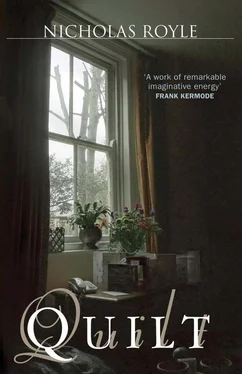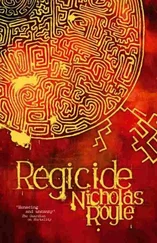Nicholas Royle - Quilt
Здесь есть возможность читать онлайн «Nicholas Royle - Quilt» весь текст электронной книги совершенно бесплатно (целиком полную версию без сокращений). В некоторых случаях можно слушать аудио, скачать через торрент в формате fb2 и присутствует краткое содержание. Год выпуска: 2011, Издательство: Myriad Editions, Жанр: Современная проза, на английском языке. Описание произведения, (предисловие) а так же отзывы посетителей доступны на портале библиотеки ЛибКат.
- Название:Quilt
- Автор:
- Издательство:Myriad Editions
- Жанр:
- Год:2011
- ISBN:нет данных
- Рейтинг книги:4 / 5. Голосов: 1
-
Избранное:Добавить в избранное
- Отзывы:
-
Ваша оценка:
- 80
- 1
- 2
- 3
- 4
- 5
Quilt: краткое содержание, описание и аннотация
Предлагаем к чтению аннотацию, описание, краткое содержание или предисловие (зависит от того, что написал сам автор книги «Quilt»). Если вы не нашли необходимую информацию о книге — напишите в комментариях, мы постараемся отыскать её.
Quilt — читать онлайн бесплатно полную книгу (весь текст) целиком
Ниже представлен текст книги, разбитый по страницам. Система сохранения места последней прочитанной страницы, позволяет с удобством читать онлайн бесплатно книгу «Quilt», без необходимости каждый раз заново искать на чём Вы остановились. Поставьте закладку, и сможете в любой момент перейти на страницу, на которой закончили чтение.
Интервал:
Закладка:
And at the same time ‘the novel’ itself has become so much a mere product, part of the ubiquitous programme. This programme operates on multiple levels, from the creative writing workshop (‘how to get your novel published’) to the inexorable machine of the publishing industry and the so-called ‘global marketplace’ (itself, obviously, a fiction), whereby every kind of book of fiction for every age and interest group can be categorised and distributed, bought and consumed, filtered and effectively neutralised. At the core of this programme is the simple but crucial determining principle: a work of literature is merely literature; a novel is just a novel . A novel can be as ‘original’, ‘brilliant’, and whatever other admiring adjectives you fancy, it can win a ‘fiction prize’, be talked about on TV, become a movie, so long as it doesn’t interfere with the running of the programme, so long as it can be satisfactorily filtered and neutralised, so long as it passes through without making any real trouble in and with language .
In the case of a work written in English the prospect is especially acute, for this language (‘international English’ or ‘Anglo-American’) is the imposing medium of freedom, as well as of inequality, hegemony and exploitation across the world. This language makes, on millions of people, insidious demands. It is oppressive and domineering, as well as a means of help towards a ‘better life’ — a fuller education, more rewarding job, widening of horizons, etc. Anglo-American is the language in which democracy, international law and human rights continue to be extended, while also remaining the lingua franca of imperialist exploitation and global capital. No language today is more poisoned and treacherous.
But, for the English novel, this is also its chance. The novel has to make trouble in and with language . It must meddle. The novelist has to aspire to a writing that figures and insists on strangeness, on what cannot be appropriated or turned over to the language police. The novel has to resist and, as far as it can, interfere with the smoothly neutralising, nulling flow of the programme. It must strive for English to appear in its most pristine form, as what it always was: a foreign language. It would thus urge a new experience of that language, inviting readers to feel for themselves the strangeness of this ‘English’ which, after all, belongs to no one. Meddling and strangeness, however, should not be confused with calculation and coldness. The novel must also be a work of love. Which means speed. It means moving, in Shakespeare’s words, ‘with wings as swift / As meditation or the thoughts of love’.
The novel can seem such an old-fashioned thing. Its pull on our attention is in many respects weak in comparison with the easy entertainments of TV, film, computer games, phones and other teletechnology. More than poems or short stories, the future of the novel seems bound up with that of the book. The book remains an object of affection, but in an increasingly rarefied, circumscribed way. And the book, we tend to think, is a slow thing, even if we also attribute to it (for example on a train journey) the ability to kill time .
In truth the novel is a key to the experience and value of speed, and to a critical understanding of those forms of teletechnology in comparison with which it can seem such a tortoise.
Take telephones. Especially in their mobile form, they speed up life and communication, intensify anticipation and knowledge, inject new complexity into postponement and decisions. This presents formidable challenges to ‘the novel today’. If you want to write a novel you really have to be engaged (no pun intended). A certain era of literature appears to be over. This was announced, in characteristically playful, downbeat fashion, by the American poet Frank O’Hara when he suggested in a little text called ‘Personism’, dating from August 1959, that there was no need for him to write a poem; instead he could simply telephone the person he wanted to address. It is not that telephone calls (or, more recently, emails or text messages) replace poems. Telephones don’t deplete pleasure, they complicate and can also of course enrich it. More subtly, they interrupt and interfere with the way we desire and think about poetry. And what goes for poetry here also goes for the novel, for any novel worthy of the name is poetic.
Writers have long had a thing about telephones. Mark Twain, Marcel Proust, Franz Kafka and James Joyce, for example, were all fascinated by the strange voice-at-a-distance that a ‘telephone’ literally is. But O’Hara’s Personism represents something new, going to the heart of what we suppose a poem might be or do. His discovery is that the telephone has been installed, there is a poetry of telephony, and no one can really write poems any more without finding themselves — and the value or purpose of their writing — on the line. O’Hara’s telephone is an updated version of E. M. Forster’s suggestive idea, in Aspects of the Novel , that writing a novel is like writing a letter.
How should a novel deal with the reality of telephones and of other, newer modes of telecommunication? To ignore or avoid reference to this reality is obviously one option; but this can inevitably come to look like disavowal or dishonesty. The future of literature is inextricably linked up with these forms of teletechnology, in the most ‘wireless’ ways conceivable. The novel has to work at new velocities, with new rhythms. It has to break up, interrupt, slow down and reroute unexpectedly. There is little point in supposing that new forms of telecommunication are going to be novel-friendly, or vice versa. The novel has to resist and twist, accommodate and diverge. After all, nothing in a work of fiction dates more quickly than the latest gizmo. A novel wants to be a joy forever, or, let’s say, a joy-fever, a fever that resists treatment, that stays with you awhile and can come back, at once chronic and fitful.
You recall the beginning: ‘In the middle of the night the phone rings, over and over, but I don’t hear it.’ The reader hears about what the narrator doesn’t hear. It is the novel calling. The novel is a kind of weird telephone exchange. Reality literature would be writing that acknowledges this weirdness and goes somewhere that was not foreseeable, either for the author or for the reader. And at the same time it makes the word ‘weird’ vibrate with all the resonances of prophecy, fate and clairvoyance we meet with in Macbeth ’s witches, the never-faraway weird sisters. Telephones exist in novels long before Alexander Graham Bell and others came along. Wherever you have a narrative or narrator telling you what a character is thinking or feeling, wherever you have someone reportedly thinking to themselves (like Alice in Lewis Carroll), wherever you have a narrator who is not the same as the author, wherever you have a story in which you hear about things which haven’t happened yet or which are happening to someone else without their knowledge, you can pick up a sense of the strange telephone network.
When do you get the call?
These things happen from time to time.
You might suppose that reality literature is the first literary genre to be explicitly derived from TV. The phrase ‘reality TV’ dates back, according to the Oxford English Dictionary , to an article published in Newsweek in March 1978. Reality TV is of course a fiction. Like everything else on TV that appears to reach us in a natural or unmediated form, whether it is a ‘wildlife documentary’ or the ‘world news’, it is constructed, programmed and ethnocentric. Reality literature invites us, on the contrary, to be wary of such constructions and narrow-mindedness. It seeks to question and complicate, to dislocate and interfere. Is it a literary reality or a literature of reality? ‘Reality literature’ lives on this duplicity. It is not a genre but something more ghostly and fleeting. Its vivacity is spectral: it knows that the dead speak and that without the completely unexpected openings generated out of mourning there would be no future. It is something that happens, perhaps, when the novel is operating at top speed, gone before you can say.
Читать дальшеИнтервал:
Закладка:
Похожие книги на «Quilt»
Представляем Вашему вниманию похожие книги на «Quilt» списком для выбора. Мы отобрали схожую по названию и смыслу литературу в надежде предоставить читателям больше вариантов отыскать новые, интересные, ещё непрочитанные произведения.
Обсуждение, отзывы о книге «Quilt» и просто собственные мнения читателей. Оставьте ваши комментарии, напишите, что Вы думаете о произведении, его смысле или главных героях. Укажите что конкретно понравилось, а что нет, и почему Вы так считаете.












